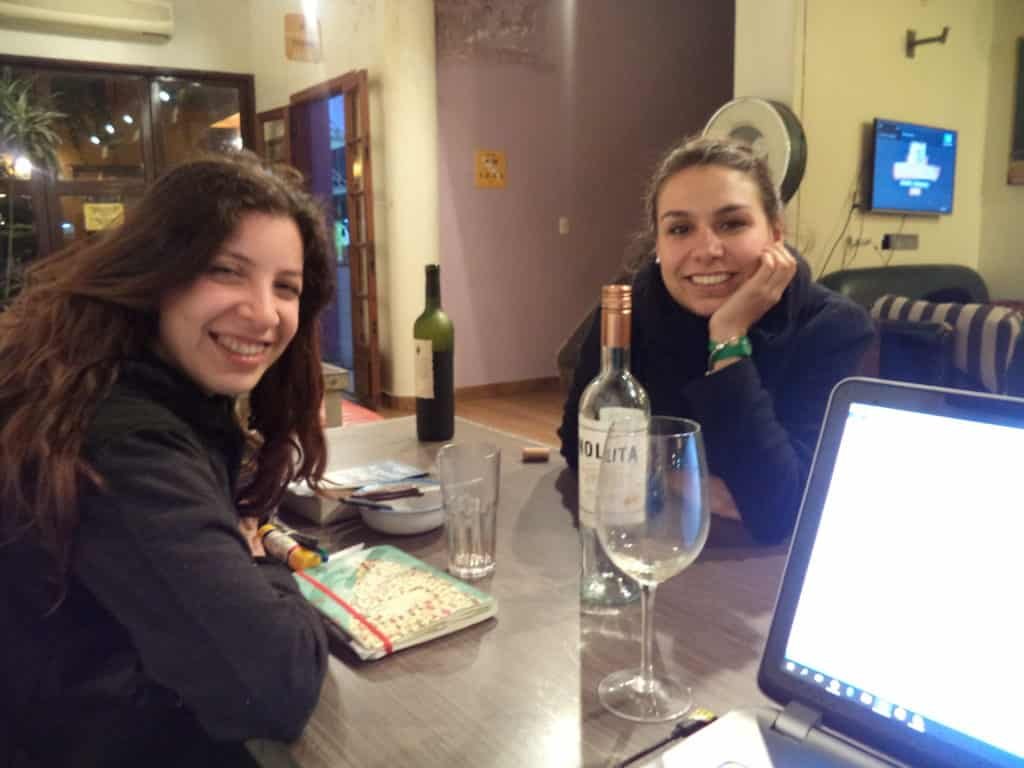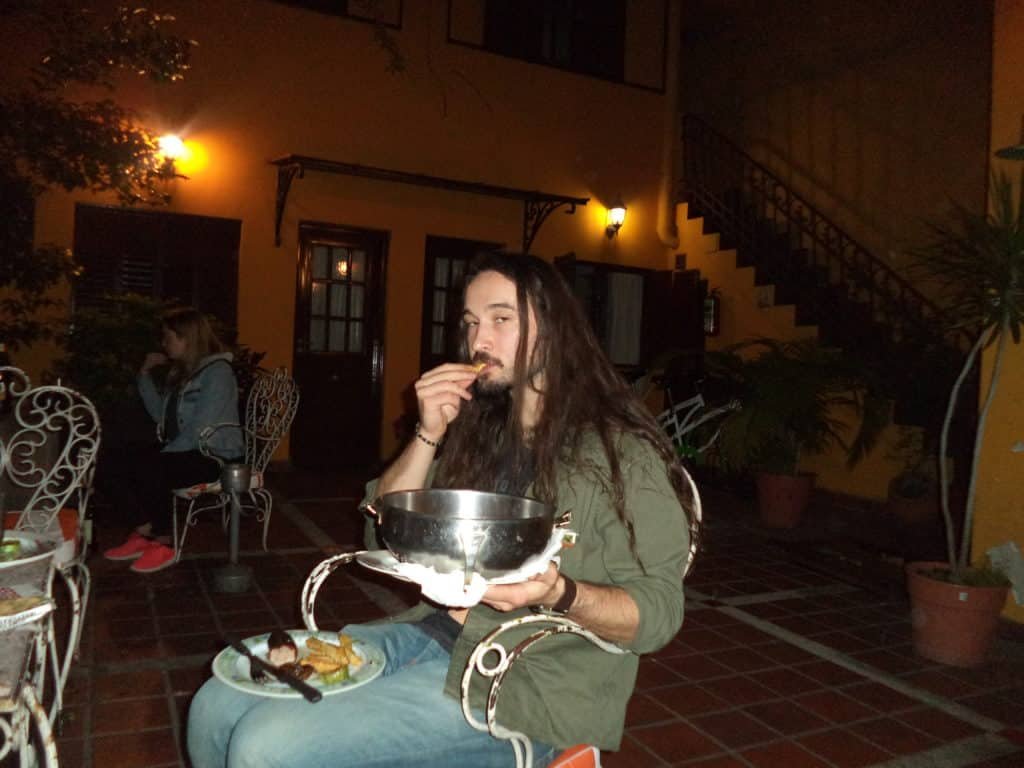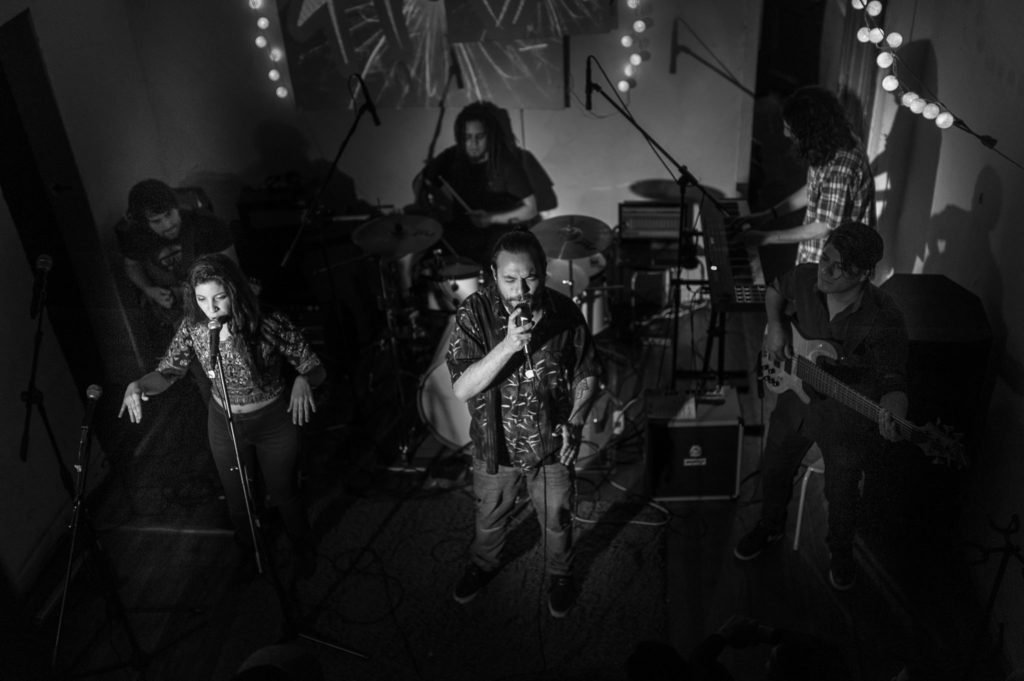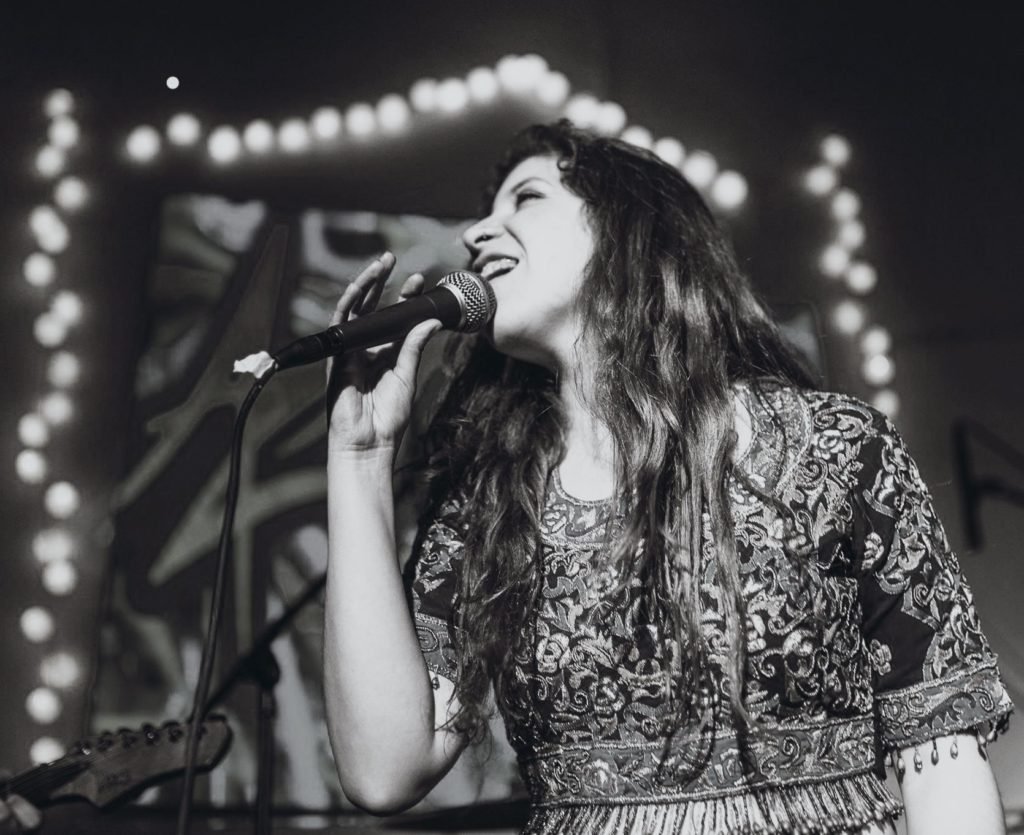
Enya (composer and lead band vocalist from Chile) and Ana (agricultural commodities specialist from Mexico) making their futures happen.
The Petri dish at Puerto Limon Hostel
This hostel of Puerto Limon is a Petri dish in which generations of humanity pass in compressed form; it is a reduction sauce that intensifies the scents and flavors of global cultures, colliding, embracing, arguing, dealing with lost loves and chasing new sensations–all in a mad, chaotic rush to imaginary finish lines: the end of a vacation, a flight from frustrations, boredom, or responsibility, or an endlessly delayed dodge of the need to return to productive life, or possibly to engage with it for the first time. The hostel is a place where you can hide from your enemies, your friends, from life, or from yourself (in the latter case, particularly is this so if you don’t like yourself, or are afraid to find out more.) The hostel is a place where you can stumble across answers to questions you were afraid to ask. Some recent specimens observed in this amazing laboratory have been:
The Vacationers
The majority of guests here are vacationers, usually from other parts of South America. These usually come in groups, sometimes just couples, and there is a lot of laughter and happy talking. They experience mild sorrow that their stay is ending, but they have roots to go back to, homes, traditions, extended families, and familiar cultures. They put in big days of sightseeing here, and go out some nights, because Buenos Aires is a city of the night. But the vacationers tend to come back a little earlier, perhaps between midnight and 2 a.m. The next day it begins all over again, and time is not to be wasted.
The Refugees
Then there are the refugees, usually from Venezuela, a country that is such a mess it makes Cuba look forward-thinking. When a guest at Puerto Limon says they are from Venezuela, you don’t have to ask if they are on vacation, or when they are planning on going “home”. They aren’t. Many of them are professionals, well educated, ambitious, and speak much better English than most Argentinians. Maybe that is because the upper middle class of Venezuala (from a time when there was a middle class at all) are the only few with enough resources left to flee the country and make their way south. The others are literally starving and millions protest in their streets. Complete lawlessness and anarchy cannot be far behind.
I will write more about individual Venezuelans in an upcoming post. The ones here in the hostel are typically young, hungry (both physically and figuratively), and eager to put a productive life together. They have a freshness and hope and joy of new-found opportunities that does the heart of this writer good. They are looking for opportunity and they are ready and willing to compete for what they want. They are generally the first to find local apartments for themselves and they put the lie to those who claim there are no jobs by the alacrity with which they find and fill openings. For them the State has been the enemy and they would rather rely on their own inner resources to survive than to rely on political promises. They will do some initial sightseeing, but basically they are all about business and getting started on a new life. They are not here to survive; they have every intention of thriving. And I have no doubt they will.
The Clueless
There is a persistent but small population of guests, usually guys but not always, who clearly are clueless, shiftless, and don’t seem to have any purpose or direction in their life beyond the next party, the next animated but empty conversation about nothing at all, sexual conquest, or drinking until the funds run out. Impressing the impressionable young of the opposite sex seems to be the outer extent of their ambitions, but even the most naive of their targets soon learn to give them a wider berth. These travelers are usually middle or upper middle class in origin, often at least bi-lingual, educated, and it is anybody’s guess where their funding comes from, but I get a sense it is limited because they are usually not big spenders, and they are shallow enough that I suspect they would show off if they had the capacity to do so. They remind me of the fat pigeons in the courtyard, who actually have nothing at all but survive quite nicely off the crumbs that fall from the tables.
The Purposeful
Finally, there is another group that I like and admire as much as the Venezuelans. They are not refugees, and they come from all types of cultural backgrounds. What defines them is their purpose and passion. They have a dream, or dreams, beyond the sheer act of survival. Some are very dramatic, like Anahi, our delightful guest from Mexico, who is here to advance her career in international commodities trading (I’ve written about Ana before). I think Ana should enroll in an acting class at a top notch school just so she would gain the attention of an agent or talent scout, because I have no doubt she could dominate the screen.
Others are quiet, thoughtful, and understated, such as one of my roommates, Ryland, from Chicago. I rarely have a conversation with Ryland where I am not surprised anew at his intellect, composure and purpose. He is currently attending a class that teaches teachers how to teach English as a foreign language. I was privileged to audit one of his classes. But what amazed me the most was Ryland’s explanation of why he is pursuing this temporary ambition.  He is an experienced traveler and of course this employment will be a source of income for him, but he has a profound interest in the English language, writing, and film and he wants to teach English as a means of enhancing his own understanding of his mother tongue! Then Ryland started telling me about phonems as an example of what he is learning about his own language. Ryland is simultaneously creating the content of his CV and the content of his character. He is anything but flashy, but extremely polite, respectful, slow to speak and worth the wait!
He is an experienced traveler and of course this employment will be a source of income for him, but he has a profound interest in the English language, writing, and film and he wants to teach English as a means of enhancing his own understanding of his mother tongue! Then Ryland started telling me about phonems as an example of what he is learning about his own language. Ryland is simultaneously creating the content of his CV and the content of his character. He is anything but flashy, but extremely polite, respectful, slow to speak and worth the wait!
About Enya
And then there is Enya de la Jara (Enya of the tree). Enya is also understated, and almost, but not quite, shy. She says she has difficulties with introspection, with communicating with herself, and then to some extent, with others. She is quiet and given to thoughtful reverie. Until she gets a microphone in her hand, and then Enya is transformed before your eyes.
She says sometimes she doesn’t recognize herself on the stage; the other persona exuding confidence in every pore takes over and controls the room. She has a silky, sexy, mellifluous voice and a range that doesn’t bore. She is a composer who has been filling school notebooks with her lyrics since she was 12 years old.
Enya grew up in a Chilean household filled with music, but not with professional musicians. Her father was in a university choir, but more as a hobby than a passion. Enya’s mother was a dancer and an English teacher. Seven of Enya’s twelve years of choir were ethnic related, the music of the indigenous Chilean people, Mapuche (People of the Land). Longing to write her own music and express ideas she had thus far found difficult to communicate, she set about learning the theory and language of music.
In Chile, music is not considered a rewarding preparation for adult life, and many music classes were lame as a result, but Enya’s father happily supported her ambitions, and Enya went to music school. It was not all smooth sailing. She was placed in an advanced placement class with students who were considerably older than Enya, and so she had to repeat that first year in summer school. She also had to repeat her last year because she had not practiced her piano enough to pass.
Enya has taught workshops in what she calls Music Composition 101. She explains the fundamentals of music; this is a melody, this is harmony, this is how we put it all together. This is functional harmony, because every chord has a function. She says lyrics just come to her; they are poetry and they have rhythm. She composes mostly about sad feelings, and through her music she exorcises negative thoughts, or she confides, maybe I just naturally don’t have that many reasons to be sad. Then she talks about the death of her grandfather, Juan, and what he meant to her, and tears fill her eyes.
Enya’s current project is music with death as a theme. She said this music form originated in Mexico where death is a saint, Santisima Muerte. Death is a universal experience and all the religions of the world are formed to deal with this reality. The pagans in various places personified death, and then sought the permission of this entity to treat it in this manner. A time honored ritual of creating your god and then deferring to it in worship or celebration. Enya talks about the Madagascar ritual called Famadihana, where they mummify the remains of the dead and exhume them every seven years, dance and party with them through the town, pray to them, ask them for health and wealth, and then bury them again for another seven years. She says laconically, it’s how they deal with death. After they die you can’t hug them anymore. She smiles and tears fill her eyes again.
I ask Enya if singing about death is going to make her music dark. She says she wants her music to be a landscape to which she transports her listeners, and like any travel, how they perceive it is up to them, whether it is happy or sad. If it’s a creepy, dark place, it’s all linked to what you have inside you. She says this is an endless, timeless topic that can and should inform everything else we do in life: how does anything we do or not do measure up if we remember that eventually we too will die? Does what I am doing with my time right now matter, knowing I will die?
I ask Enya ultimately what is her music all about. She says her greatest act of creation is becoming the person she wants to be. There is a spark of the rebel in her when she describes how the indigenous people have kept their culture alive after Catholicism was forced on them hundreds of years ago. Or more correctly stated, how Catholicism and the local paganism were merged. The indigenous people resorted to symbolisms in their music and rituals that went unnoticed by the conquerors and missionaries; it was a form of resistance, their way of saying, you converted us, but you really didn’t. Those symbolisms live on today in their culture.

Enya says she wants her music to transport her listeners to a different place, and the nature of the trip depends on what is going on inside the listener. Photo courtesy of Diego Soto.
Enya says no one in South America wants to move beyond unthinking tradition. No one wants to know more and they don’t like questions that take them beyond their comfort zone. She says her desire to travel is to find some of her own answers. Enya is not depressed and her interest in death is not morbid but an inquiry into the nature of life and the search for meaning. Within the grander context of the road her life has taken, she says this has been her first trip alone, away from home, and she was afraid. She cried for an hour at the airport. Her boyfriend, Tomas, who hand builds guitars, urged her to go in spite of her fears. “He is a very special person.” I had to agree. So respectful of her developmental needs and so lacking in the usual relationship jealousies and insecurities.
Enya, Ana, Ryland and others I have not written about (yet) give me courage and renew the joy of my life every day: their enthusiasm, curiosity, openness, and perhaps most of all, their purposefulness, that they are about something, creating value and meaning beyond eating, drinking, the satisfaction of biological urgings, and banal conversation. The specific direction their lives take really doesn’t matter as much as the fact that they have a direction, one of their choosing, and one that contributes a sense of meaning to their existence.
As always, thank you for reading. My FB page was recently hacked and I took it down. So if you enjoy reading these posts, please insert your email address at the top right of this blog page and you will receive every post. Otherwise I have no way of making sure you get notification.
Comments are always welcome. Share with your friends, especially those interested in perspectives far from home.
Thanks,
John Bechtel


John, as usual, with his pallet of colorful and descriptive words, has painted a picture of the lives of people whom he comes in contact with. His many stories have been both very entertaining and informative. I envy what he is doing and the life he has chosen to live for the time being. I have said many times that everyone needs to go to Paris and London at least once in their lives. I have now added Buenos Aires to the list.
Harlan J. Hunter
I feel joy and freedom in what you write. In the content and through the words you select. Your style is inclusive and infectious making me want to read more and more at every turn.
You accept how people are and respect who they are. Everyone wants this. Even the fat pigeons looking for crumbs such like me!
Thanks for the compliment, Doug. For the rest of my readers, Doug is a Californian senior citizen whose acquaintance I made quite by accident one evening at the hostel when he gave me, a stranger, his French Fries from the parilla next door. I happened to know they made really good French Fries that were wonderful with malt vinegar, so I accepted and we began to chat. The next day, which was Doug’s last in Buenos Aires, we spent a few hours wandering around and talking. Doug ate his first choripan (a sausage sandwich) and sharing perspectives. Doug is an intrepid traveler, and it just seemed like with each new topic I discovered another country he had been to. We both shared a great day together and I joked with him that he should be more careful who he gave his French Fries to in the future. It could lead to unintended consequences, like new friendships in unexpected places.
Lovely writing, John. I look forward to your profiles so much.
Thank you, Rick. For our other readers, Rick is the star chef of the hostel and a consummate pizza party organizer. He also does website developing, keeps the lid on the place during third shift, and teaches kitchen etiquette to the unknowing or uncaring. He is everybody’s favorite here and the soul of the place. He hails originally from Indiana but’s he’s been a few other places too. Don’t tell anyone, but he also gives high quality custom guided tours of certain barrios in Buenos Aires. For a fee, of course. (We’re all in various stages of entrepreneurship here.)
Oh my dearest John – I love seeing your name in my mail box. I know there will be something wonderful to read and think about. The insights you share open windows to a universe I can only imagine, but lack the guts to enter. Thank you for your words.
By the way – where do you see yourself in the Petri dish?
–MaryGo
My, my, MaryGo, such chutzpah! ‘Where do I see myself in the Petri dish?’ Such temerity! I had to giggle. I’m the guy addicted to his microscope, telescope, and gyroscope. Maybe it’s a form of benevolent, intellectual voyeurism. The questions bubble up in my head faster than I can find answers. I am less fascinated with what we do than why we do it; by the contradictions between our incredible creativity and our self-destructiveness, between our beauty and our ugliness, our capacity to love contrasted with our will to power and desire to rule others, all on spaceship Earth, destination unknown. The pace of change is accelerating, but how is the core human inside us adapting? The ground is trembling beneath our feet, but survival demands our constant focus elsewhere, on things that matter but don’t matter. So I am a reporter from the front lines of the human experience, and I try to bring stories about the forgotten man and woman. In an era of mass everything, when journalism as a profession feels more like propaganda to me than truth seeking, I am an emissary or missionary of nothing; I seek to understand. I have a soft spot in my heart for people of independent spirit who are trying to achieve heroic things in their unnoticed lives, and maybe, for a few precious moments when we connect, they know they were seen; somebody got it, what they were trying to do. The Community Room here at Puerto Limon Hostel is a metaphor for life on this planet; the noise level can be deafening, but Enya the musician in this article, was here for three days without talking to anyone. I was the first to engage her in conversation, and this morning before she left she thanked me for that. This, and the writing, are what drive me.
This is a big smile.
John,
Your replies are like a soothing ointment to an achy soul.
Harlan J. Hunter
On a bad day my body needs the ointment more than the soul. 🙂
I just read a piece of the intro and the Enya part.
She is an amazing person, the way you write and show her essence is incredible. I felt the way she impressed and captivated you, and this happens to everyone who got’s to know her.
Bastian, thanks for reading and for writing a comment. There’s no question Enya is special. How do you know her? Are you a fellow musician?
I have spent my first hours of this day catching up on reading your stories from Argentina. Enya is a beautiful soul. Many thanks to her boyfriend for encouraging her to take the trip. Many thanks to you for introducing her to us.
I was a little surprised to see ‘bogart01’ appear at the comment line. I didn’t even remember that account. I don’t think I’ve used it for at least 8-10 years. I guess I should thank you for reminder. I’ll have to check myself out.
Karen